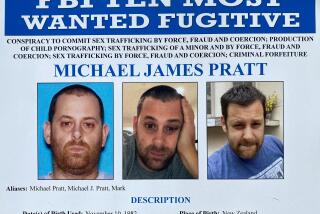Eighth member of sex-trafficking ring pleads guilty
- Share via
They were teenage girls desperate for something better: They came from group homes or families that were broken. Some already had children of their own and were struggling to provide for them.
There were also girls who came from environments that seemed more stable, but still, they were drawn into prostitution by the promise of money and independence.
“They knew what to say and do to entice them,” prosecutor Ami Sheth said of the sex-trafficking ring that lured girls from the Inland Empire to Los Angeles County, where they had sex for money at motels in Compton and Lynwood and faced verbal and physical abuse if they didn’t make enough. “Once these girls ended up in Compton, it wasn’t the type of world they expected.”
Now, three years after the investigation into the operation began, the ring’s final member has pleaded guilty to sex-trafficking charges as his trial was set to begin. Seven others have already pleaded guilty to charges related to sex trafficking or racketeering.
Paul Edward Bell, an alleged member of the Rolling 60s Crips in Lynwood, admitted his guilt in a Riverside courtroom this week as part of a plea agreement that included a sentence of 30 years in federal prison, according to a statement from the U.S. attorney’s office. The prison term must be approved by U.S. District Judge Virginia A. Phillips at a March sentencing hearing.
In the plea, Bell, 29, acknowledged his role in the operation, including recruiting four girls who were 15 to 17 years old. He described one instance in which he had physically abused one of them; she hadn’t been meeting his demands and was “acting up,” according to the plea agreement.
“Sex trafficking is an abominable crime that condemns its victims to physical and psychological trauma, hardship and abuse,” U.S. Atty. André Birotte Jr. said in a statement, adding that Bell and the others “coldly and brutally victimized young women and juveniles, subjecting them to treatment that can only be described as inhumane.”
Birotte said Bell would be “held accountable and punished for his predatory conduct.”
The investigation into the operation — one in a string of such cases pursued by federal prosecutors who list sex-trafficking as a priority — began in January 2011, when Riverside County sheriff’s investigators learned of allegations that students at area schools were being lured into prostitution.
Prosecutors said that one of the lead prostitutes in the ring, Kimberly Alberti, acted as a recruiter, targeting girls who lacked financial and family support or seemed easy to convince.
She’d “groom” the girls, some of whom were former classmates of hers, prosecutors said. She would work to gain their trust and offer them what seemed like an opportunity for money and independence, prosecutors said. Once they agreed, they were taken to Los Angeles County, where they were housed in motels or in Bell’s apartment.
Investigators were able to identify seven girls as victims of sex trafficking, although prosecutors said there were likely others.
The eight members of the ring were indicted in August 2012 by a federal grand jury. All but one are waiting to be sentenced by Phillips in the coming months.
The others include two pimps — Samuel Rogers, 23, and his brother, Gary Rogers, 25, both of Moreno Valley — as well as three women described by prosecutors as lead prostitutes: Javiya Brooks, 21, of Lynwood, who worked for Bell; Kristy Harrell, 21, of Riverside, who worked for Gary Rogers; and Samuel Rogers’ head prostitute, Alberti, 20, of Riverside.
Christopher Weldon, 24, of Compton — Bell’s half-brother — was sentenced to six years in prison.
Su Yan, 31, pleaded guilty to a racketeering-related charge for helping Bell run his prostitution business, but he wasn’t directly involved in sex trafficking.
Sheth, an assistant U.S. attorney based in Riverside, said she counted the prosecution as a success not just because of the convictions. The cases were closed without a trial, she said, sparing the young women from having to testify, face the people who dragged them into prostitution and relive a part of their life many of them are still working to overcome.
“Some are on the right road,” Sheth said. “Some of the victims are still struggling with what happened to them.”
She said many have had to return to the lives and troubles they had been enticed into fleeing. It is her hope that the final conviction will mark the end of this particularly painful chapter of their lives.
“That will help them move forward and move on in their lives,” Sheth said.
More to Read
Sign up for Essential California
The most important California stories and recommendations in your inbox every morning.
You may occasionally receive promotional content from the Los Angeles Times.









